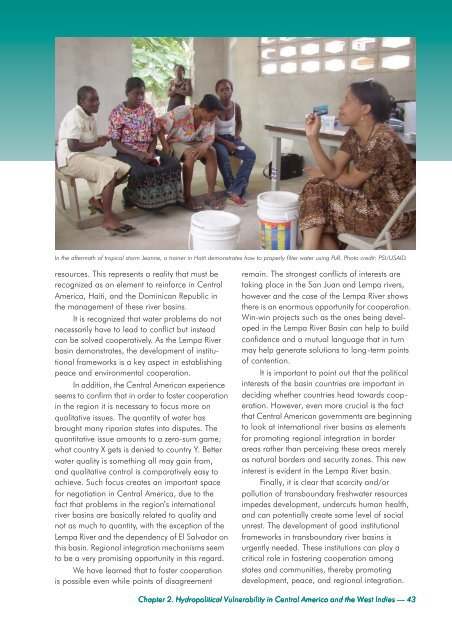Latin America; in English (pdf) - Transboundary Freshwater Dispute ...
Latin America; in English (pdf) - Transboundary Freshwater Dispute ...
Latin America; in English (pdf) - Transboundary Freshwater Dispute ...
Create successful ePaper yourself
Turn your PDF publications into a flip-book with our unique Google optimized e-Paper software.
In the aftermath of tropical storm Jeanne, a tra<strong>in</strong>er <strong>in</strong> Haiti demonstrates how to properly filter water us<strong>in</strong>g PuR. Photo credit: PSI/USAID.<br />
resources. This represents a reality that must be<br />
recognized as an element to re<strong>in</strong>force <strong>in</strong> Central<br />
<strong>America</strong>, Haiti, and the Dom<strong>in</strong>ican Republic <strong>in</strong><br />
the management of these river bas<strong>in</strong>s.<br />
It is recognized that water problems do not<br />
necessarily have to lead to conflict but <strong>in</strong>stead<br />
can be solved cooperatively. As the Lempa River<br />
bas<strong>in</strong> demonstrates, the development of <strong>in</strong>stitutional<br />
frameworks is a key aspect <strong>in</strong> establish<strong>in</strong>g<br />
peace and environmental cooperation.<br />
In addition, the Central <strong>America</strong>n experience<br />
seems to confirm that <strong>in</strong> order to foster cooperation<br />
<strong>in</strong> the region it is necessary to focus more on<br />
qualitative issues. The quantity of water has<br />
brought many riparian states <strong>in</strong>to disputes. The<br />
quantitative issue amounts to a zero-sum game;<br />
what country X gets is denied to country Y. Better<br />
water quality is someth<strong>in</strong>g all may ga<strong>in</strong> from,<br />
and qualitative control is comparatively easy to<br />
achieve. Such focus creates an important space<br />
for negotiation <strong>in</strong> Central <strong>America</strong>, due to the<br />
fact that problems <strong>in</strong> the region’s <strong>in</strong>ternational<br />
river bas<strong>in</strong>s are basically related to quality and<br />
not as much to quantity, with the exception of the<br />
Lempa River and the dependency of El Salvador on<br />
this bas<strong>in</strong>. Regional <strong>in</strong>tegration mechanisms seem<br />
to be a very promis<strong>in</strong>g opportunity <strong>in</strong> this regard.<br />
We have learned that to foster cooperation<br />
is possible even while po<strong>in</strong>ts of disagreement<br />
rema<strong>in</strong>. The strongest conflicts of <strong>in</strong>terests are<br />
tak<strong>in</strong>g place <strong>in</strong> the San Juan and Lempa rivers,<br />
however and the case of the Lempa River shows<br />
there is an enormous opportunity for cooperation.<br />
W<strong>in</strong>-w<strong>in</strong> projects such as the ones be<strong>in</strong>g developed<br />
<strong>in</strong> the Lempa River Bas<strong>in</strong> can help to build<br />
confidence and a mutual language that <strong>in</strong> turn<br />
may help generate solutions to long-term po<strong>in</strong>ts<br />
of contention.<br />
It is important to po<strong>in</strong>t out that the political<br />
<strong>in</strong>terests of the bas<strong>in</strong> countries are important <strong>in</strong><br />
decid<strong>in</strong>g whether countries head towards cooperation.<br />
However, even more crucial is the fact<br />
that Central <strong>America</strong>n governments are beg<strong>in</strong>n<strong>in</strong>g<br />
to look at <strong>in</strong>ternational river bas<strong>in</strong>s as elements<br />
for promot<strong>in</strong>g regional <strong>in</strong>tegration <strong>in</strong> border<br />
areas rather than perceiv<strong>in</strong>g these areas merely<br />
as natural borders and security zones. This new<br />
<strong>in</strong>terest is evident <strong>in</strong> the Lempa River bas<strong>in</strong>.<br />
F<strong>in</strong>ally, it is clear that scarcity and/or<br />
pollution of transboundary freshwater resources<br />
impedes development, undercuts human health,<br />
and can potentially create some level of social<br />
unrest. The development of good <strong>in</strong>stitutional<br />
frameworks <strong>in</strong> transboundary river bas<strong>in</strong>s is<br />
urgently needed. These <strong>in</strong>stitutions can play a<br />
critical role <strong>in</strong> foster<strong>in</strong>g cooperation among<br />
states and communities, thereby promot<strong>in</strong>g<br />
development, peace, and regional <strong>in</strong>tegration.<br />
Chapter 2. Hydropolitical Vulnerability <strong>in</strong> Central <strong>America</strong> and the West Indies — 43
















